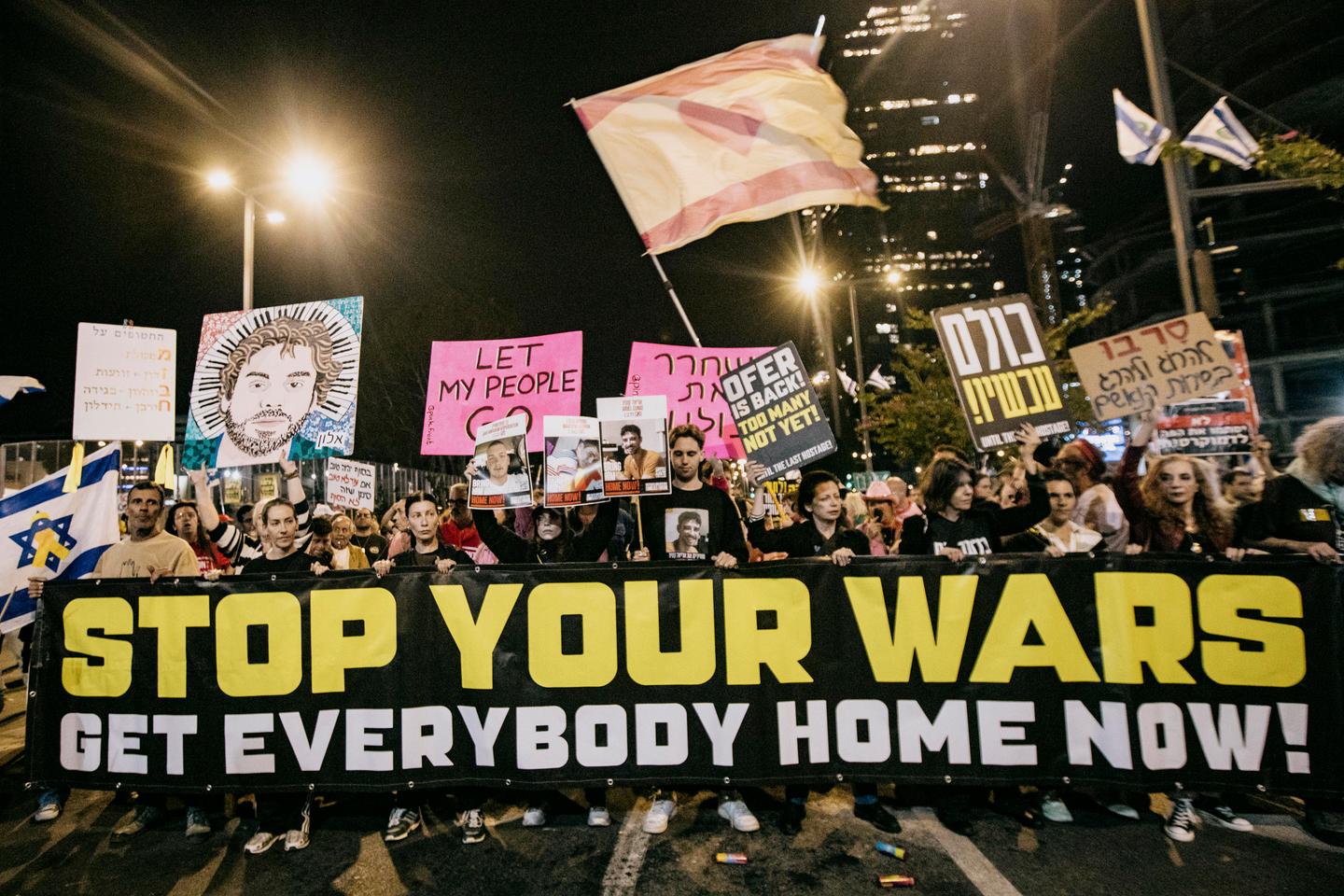Tel Aviv Saturday: Anti-Netanyahu Protests Rage – Thousands Take to the Streets
Editor’s Note: Massive anti-Netanyahu protests erupted in Tel Aviv today, marking another significant escalation in the ongoing political crisis.
Why This Matters: Israel's Deepening Political Divide
Israel is experiencing a period of intense political polarization. The ongoing protests against Prime Minister Benjamin Netanyahu and his judicial overhaul plans highlight deep divisions within Israeli society regarding the rule of law, democracy, and the future of the nation. This article will delve into the key aspects of Saturday's demonstrations, analyzing their significance and potential implications. Understanding these protests is crucial for grasping the complexities of Israeli politics and the potential for further unrest.
Key Takeaways
| Point | Description |
|---|---|
| Scale of Protests | Tens of thousands participated, exceeding previous demonstrations in size and intensity. |
| Key Demands | Primarily focused on halting the judicial overhaul, protecting democratic institutions, and opposing Netanyahu. |
| Government Response | The government has yet to officially respond, but rhetoric from officials has been largely dismissive. |
| International Concerns | The protests raise international concerns about Israel's democratic trajectory and stability. |
Tel Aviv Saturday: A Sea of Protesters
The atmosphere in Tel Aviv on Saturday was electric. Tens of thousands of Israelis, from diverse backgrounds and political affiliations, converged to voice their opposition to Prime Minister Netanyahu's government and its controversial judicial overhaul. The scale of the protest surpassed previous demonstrations, demonstrating a growing level of public discontent. This surge in participation underscores the depth of concern surrounding the proposed changes to the judicial system, perceived by many as a threat to the country's democratic foundations.
Key Aspects of the Protests
- Location: Primarily focused in Tel Aviv, a city known for its liberal leanings, but similar protests occurred across the country.
- Demographics: A broad cross-section of Israeli society participated, including secular and religious Jews, Arabs, and individuals from various socioeconomic backgrounds.
- Messaging: Protest signs and chants focused on protecting democracy, opposing the judicial overhaul, and demanding Netanyahu's resignation.
Detailed Analysis of the Protests
The protests were largely peaceful, though some instances of minor clashes with police were reported. The sheer size and passionate nature of the demonstrations sent a powerful message to the government, highlighting the widespread opposition to the judicial overhaul. Comparisons are often drawn to past large-scale protests in Israel, illustrating the historical context of civil resistance against government policies. The sustained nature of these protests, week after week, signals a determined effort to influence the government's course.
Interactive Elements: The Role of Social Media
Social Media's Amplifying Effect
Social media played a crucial role in organizing and publicizing the protests. Hashtags like #SaveTheDemocracy and #IsraelProtests trended globally, showcasing the international attention drawn to the event. Live streams and posts allowed people worldwide to witness the scale and energy of the demonstrations, further amplifying the message of dissent. The rapid spread of information through social media platforms mobilized participants and helped coordinate efforts across different groups and locations.
Interactive Elements: International Reactions and Concerns
Global Implications of the Protests
International reactions to the protests have been mixed but generally reflect concern about the potential implications for Israel's democratic institutions. Some countries have expressed cautious optimism about the government's willingness to negotiate, while others have voiced stronger warnings against undermining the rule of law. The protests underscore the broader global concern about the erosion of democratic norms in certain countries. The international community is closely monitoring the situation, particularly given Israel's strategic importance in the region.
People Also Ask (NLP-Friendly Answers)
Q1: What is the judicial overhaul?
A: The judicial overhaul refers to proposed changes to Israel's judicial system, granting the government more power over judicial appointments and potentially limiting the Supreme Court's ability to review legislation.
Q2: Why are people protesting?
A: People are protesting because they fear the judicial overhaul will undermine Israel's democracy, weaken checks and balances, and concentrate excessive power in the government.
Q3: How can I support the protesters?
A: You can support the protesters by staying informed about the situation, sharing information about the protests on social media, and contacting your representatives to express your concern.
Q4: What are the potential consequences of the overhaul?
A: Potential consequences include a weakening of democratic institutions, increased political instability, and damage to Israel's international standing.
Q5: What is the government's response?
A: The government's response has been largely dismissive of the protests, with officials maintaining that the reforms are necessary.
Practical Tips for Understanding the Israeli Political Crisis
- Follow reputable news sources: Stay informed about developments from trusted news outlets.
- Engage in respectful dialogue: Discuss the issues with people holding differing viewpoints.
- Learn about the judicial system: Understand the intricacies of the Israeli judicial system and the proposed changes.
- Support organizations advocating for democracy: Consider donating to or volunteering with organizations working to protect democracy in Israel.
- Contact your representatives: Let your elected officials know your concerns.
- Learn Hebrew/Arabic: Improved language skills will enhance your understanding of local perspectives.
- Follow Israeli commentators: Diverse perspectives are crucial for understanding the crisis.
- Explore relevant academic research: Articles and books can provide deeper analysis.
Summary: Saturday's protests in Tel Aviv represent a significant escalation in the ongoing struggle over Israel's future. The scale and intensity of the demonstrations highlight the deep divisions within Israeli society and raise concerns about the country's democratic trajectory.
Closing Message: The protests in Tel Aviv serve as a stark reminder of the fragility of democracy and the importance of civic engagement. What steps do you believe are necessary to ensure the protection of democratic values in Israel and elsewhere?
Call to Action: Share this article to raise awareness about the situation in Israel and stay updated on further developments by subscribing to our newsletter.

